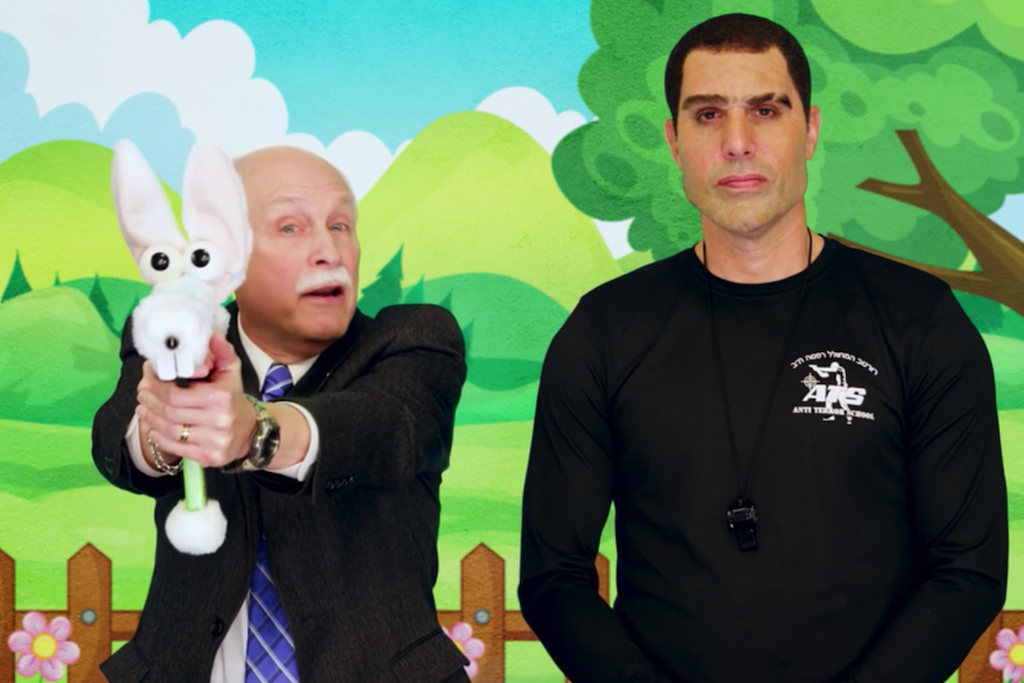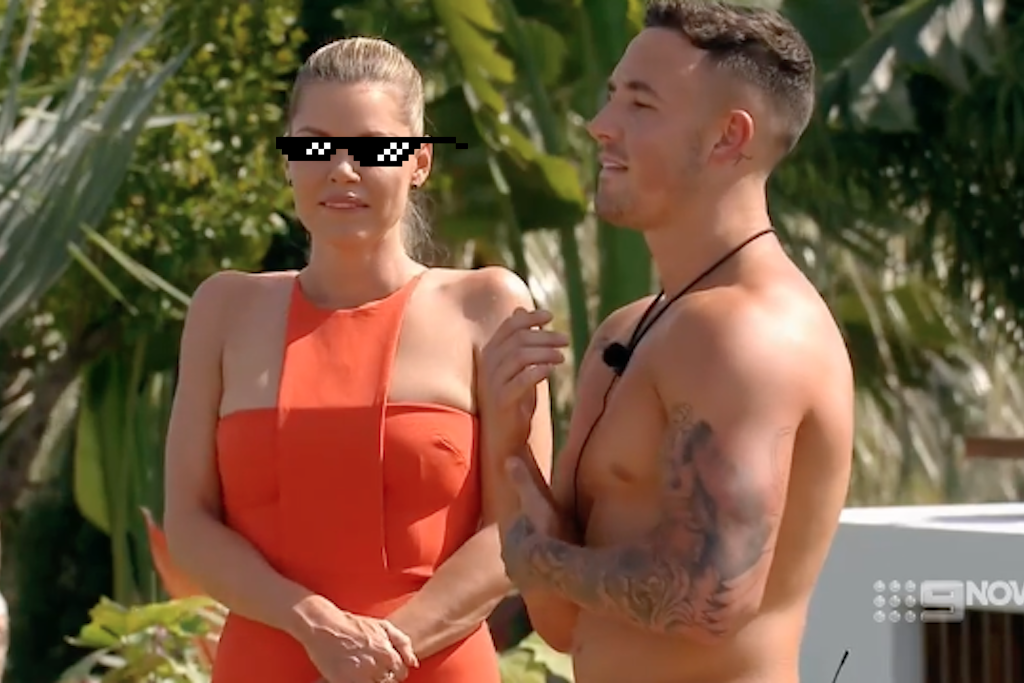Should You Bother Watching: ‘UnREAL’ Season 4?
This is not what a feminist looks like.
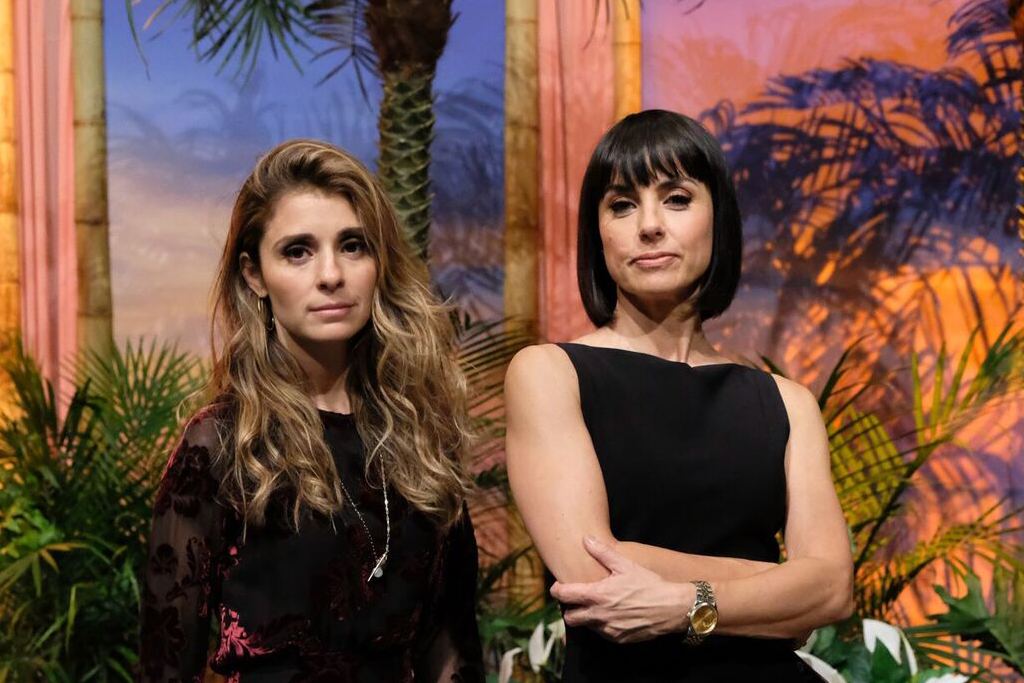
Welcome to ‘Should You Bother Watching’, Junkee’s column which helps to answer the streaming-age’s biggest question: is this show for me?
When it premiered in 2015, UnREAL was sold as a dark and confronting look at how reality TV was really made, set behind-the-scenes of fictional dating show ‘Everlasting’. For a further meta show-within-a-show mind-fuck, it was all loosely based off co-creator Sarah Gertrude Shapiro’s time as a real life producer on The Bachelor.
In promo interviews, Shaprio spoke candidly about how alarmingly easy she found it to manipulate contestants, saying she often wanted to quit to save her soul, but never did. It wasn’t a stretch to see her within Rachel Goldberg (Shiri Appleby), UnREAL‘s natural manipulator but morally troubled ‘Everlasting’ producer who ends most seasons by quitting, before coming back next season.
That tension is UnREAL‘s true draw — the debauchery is scandalous entertainment, but watching both contestants and producers wrestle with their motives proved fascinating, as viewers wondered why anyone subjects themselves to the reality TV circus.
Unfortunately since its stellar first season, that question’s shifted, as viewers and critics tend to ask ‘why am I still subjecting myself to this?’. As Rachel and her cohort routinely abandoned their morals for little reason (and the show began to build up a body count) other than to keep the show moving, the soap-operatic tendencies reached sadistic heights. While UnREAL is probably at its most fun when it leans into perverse thrills, later seasons sacrificed that conflict of conscience for cheap exploitation.
As AV Club wrote in their season four review, “Every time you think the show—Everlasting, UnREAL, or both—has gone as low as it possibly can, it somehow sinks even deeper.” With fans and critics tuning out, earlier this year US network Lifetime cancelled UnREAL, selling off the unaired final season to Hulu (in Australia, the show’s on Stan). It’s not exactly a vote of confidence.
Still, if you’ve stuck with UnREAL this far, you kind of have to see it to the end — what’s eight more episodes, in the scheme of things? Here’s a quick rundown of the pros and the cons of Season 4, to see if you’re up for the bumpy ride.
PROS
It’s A Much Needed Shake-Up
As each episode of UnREAL follows an episode of ‘Everlasting’, the show is formulaic by design. And much like a reality tv show in need of a revamp, UnREAL‘s final season takes a lot of risks to keep your attention.
The main difference is that this season centres on a Bachelor In Paradise-styled ‘Everlasting: All Stars’. Returning are some of the more interesting ‘Everlasting’ alumni, such as Russian ballet dancer-and-addict Alexi and Australian eco-warrior August, among ‘old favourites’ who pre-date UnREAL. But it’s newcomer Candy Coco (Natalie Hall), a single-mother stripper on the show to promote her own upcoming reality show, who proves UnREAL‘s saving grace.
Hall’s an incredibly funny actress, and for better or worse, Coco is written with more depth than most of the series regulars. Her character’s antics may be wild, but they’re savvy and always have a motive, something Rachel seems to lack for most of the season. Which is why ‘Everlasting’ show-runner Quinn King (Constance Zimmer), her mentor-in-deception, is disturbed by Rachel’s increasingly low blows (essentially fracturing their dynamic for most of the season, which is the heart of the show. But hey, this is the ‘pro’ section).
Rachel’s new partner-in-crime is producer Tommy (Francois Arnaud), and their increasingly awful treatment of the cast comes off as a flirtatious sadist power-play, á la Cruel Intentions. As their antics spiral out of control, it genuinely feels like most characters’ lives are in danger. Given that this is UnREAL‘s last season, there’s no pretense that the ‘Everlasting’ mansion will still stand by the season’s end — there’s more tension than the show’s ever had, and it keeps you continually guessing how it’s going to burn down.
As things go horribly wrong, it’s a wild, thrilling watch that makes you feel culpable for enjoying the ride — capturing some of that spark of season one.
CONS
Is This Is Really What A Feminist Looks Like?
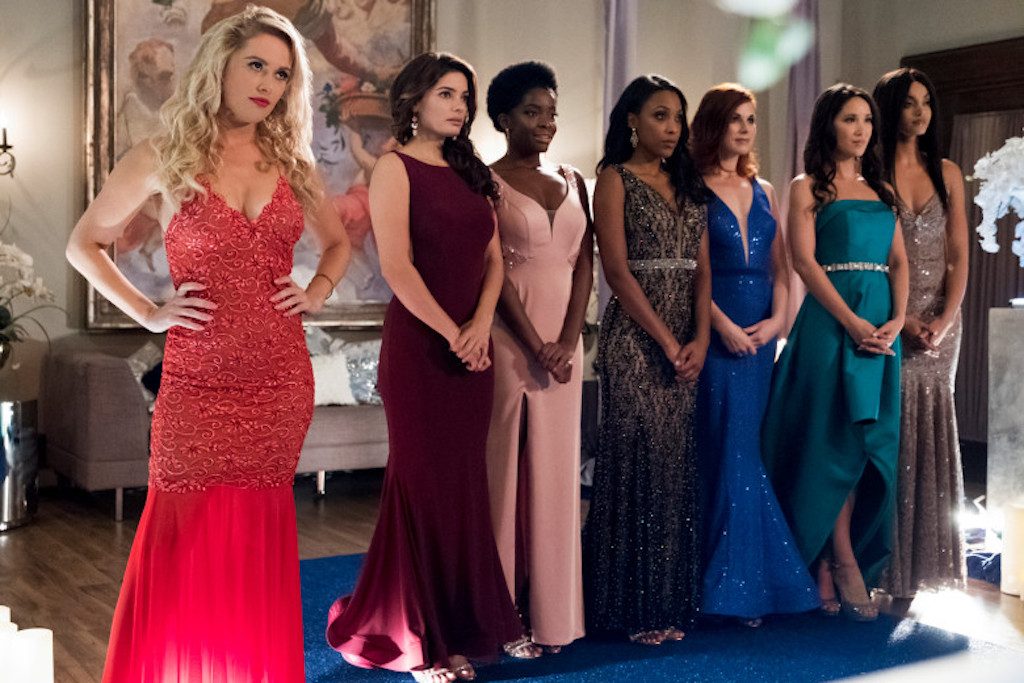
Candy Coco (Natalie Hall, left) has no time for Rachel’s bullshit.
While UnREAL‘s appeal is in watching characters step over the line, season four sees ‘Everlasting’ at its most cruel — it simply goes too far.
Take, for example, ‘Hump And Dump’, the first of many game segments on ‘All Stars’. Female contestants walk across a bridge, parading themselves in front of the boys — then they fall through a trap door into a muddy pool if the men aren’t unanimously horny for them. As Quinn says to Rachel, “This is the most sexist, misogynistic bullshit we’ve ever done, and I love it! It’s so dark, it’s sooo demented! And [you have] no sense of feminist guilt?”
Rachel laughs it off. It’s clear she’s a far cry from the show’s pilot, where she wore a pointed “This Is What A Feminist Looks Like” t-shirt. And the show’s aware of that — halfway through this season, the shirt’s slogan is ironically paraphrased by contestant Roger, who back in UnREAL‘s first season, date-raped contestant Maya. And guess who is also on ‘All Stars’?
Naturally, it’s no oversight: Rachel has brought them together to produce a powerful #MeToo confrontation, promising Quinn it’ll happen “by episode four”. It’s a careful, devious orchestration, one that involves disclosing her own rape as a way to gain trust with Maya. Moments later, she feeds Roger his feminist monologue so he’s not prematurely eliminated before the big moment.
Later, Rachel attempts to goad Maya out of a mental breakdown and into an explosive confrontation through humiliation, creating a challenge so contestants pelt her with eggs. Finally, Rachel sets up the field for Roger to take advantage of another woman, with hopes Maya will run in and prevent it. Without spoiling anything further, things don’t work out as planned. It’s one of the UnREAL‘s most reprehensible moments.
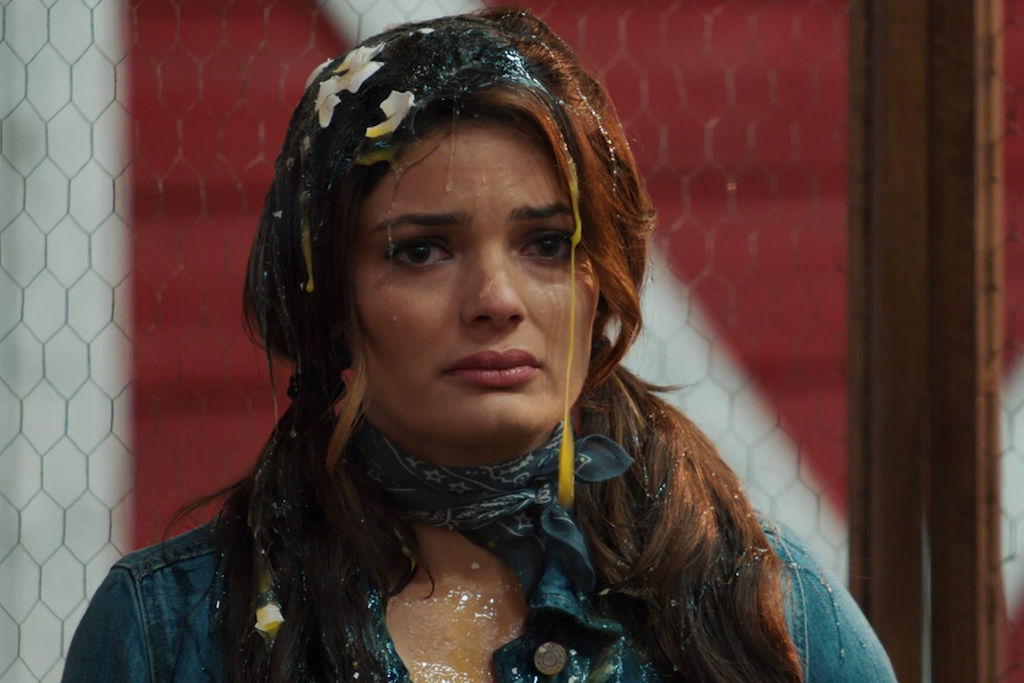
Maya (Natasha Wilson).
Of course, Maya isn’t a real person, and the morals of ‘Everlasting’ aren’t those of the show. But the lines are blurred when UnREAL abuses its own character for the same reality TV thrills it’s supposed to critique. This storyline stinks of a way to capitalise off a “cultural conversation” around sexual assault without adding anything to it. It merely replicates pain and trauma, and hopes depiction is enough to pass as contribution — something which The Handsmaid’s Tale‘s voyeuristically violent second season has been critiqued for, too.
The show clearly wants us to see Rachel’s acts as abhorrent, and the season a turn for the worse enabled by an industry with little regard for women. And unfortunately, her actions are only slightly stranger-than-fiction: last year, the US version of Bachelor In Paradise was cancelled mid-filming due to a sexual assault between contestants which could have been prevented by producers. But what purpose does echoing that terror do?
As Arielle Bernstein wrote in her The Guardian review, “At a certain point, bingeing on episode after episode where contestants are plunged into pools, assaulted with raw eggs and cajoled into slut-shaming one another, you start to wonder if watching UnREAL is really a protest against a misogynistic world, or just a reiteration of everything that is wrong with it.”
So, Is It Worth Watching?
At it’s best, UnREAL is a powerful-and-funny examination of both the mechanics of reality TV, and the enduring forces which compromise women into archetypes.
Part of what made UnREAL so great is that Rachel and Quinn were proof that female characters (people, even) existed beyond crudely drawn outlines, messy as their interiority’s were. Even contestants, whose fears and emotions were so much more empathetic off-camera, felt real — you understood why most of them were on ‘Everlasting’, even if you knew it was a terrible idea.
UnREAL‘s final season forgets that, instead reverting Rachel to a super villain up until the last minute. In a recent interview, Shapiro says she always wanted UnREAL to end with Rachel ‘getting out’ of ‘Everlasting’ — and sure enough, she walks away from her messes. On one hand, it’s optimistic — Rachel’s even wearing an ‘I’m Still With Her’ shirt, the 2018 version of ‘This Is What A Feminist Looks Like’. On the other, it’s just another slogan.
UnREAL season four is streaming on Stan.
Jared Richards is a staff writer at Junkee, and co-host of Sleepless In Sydney on FBi Radio. Follow him on Twitter.
